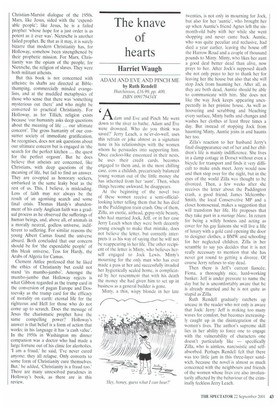The knave
of hearts
Harriet Waugh
ADAM AND EVE AND PINCH ME by Ruth Rendell Hutchinson, £16.99, pp. 400, ISBN 009179434X 'A dam and Eve and Pinch Me went down to the river to bathe. Adam and Eve were drowned. Who do you think was saved?' Jerry Leach, a ne'er-do-well, uses this refrain or joke almost as a signature tune in his relationships with the women whom he persuades into supporting him. Once cuckoo-like ensconced in their nests, he uses their credit cards, becomes engaged to them and, in the most chilling case, cons a childish, precariously balanced young woman out of the little money she has inherited from her 'aunt'. Then, when things become awkward, he disappears.
At the beginning of the novel two of these women receive a semi-officiallooking letter telling them that he has died in the Paddington train crash. One of them, Zilla, an exotic, airhead, gypsy-style beauty, who had married Jock, Jeff, or in her case Jerry Leach when they were both decently young enough to make that mistake, does not believe the letter, but correctly interprets it as his way of saying that he will not be reappearing in her life. The other recipient of the letter is Minty, who believes herself engaged to Jock Lewis. Minty's mourning for the only man who has ever made a pass at her and successfully invaded her hygienically sealed home, is complicated by her resentment that with his death the money she had given him to set up in business as a general builder is gone.
Minty, a thin, wispy blonde in her late twenties, is not only in mourning for Jock, but also for her 'auntie', who brought her up when Auntie's friend Agnes left the sixmonth-old baby with her while she went shopping and never came back. Auntie, who was quite peculiar and reclusive, had died a year earlier, leaving the house off the Harrow Road and a couple of thousand pounds to Minty. Minty, who likes her aunt a good deal better dead than alive, now prays to her. After Jock's supposed death she not only prays to her to thank her for leaving her the house but also that she will stop Jock from haunting her. After all, as they are both dead, Auntie should be able to communicate with him. She does not like the way Jock keeps appearing unexpectedly in her pristine house. As well as hoovering and scrubbing and bleaching every surface, Minty baths and changes and washes her clothes at least three times a day. But instead of stopping Jock from haunting Minty, Auntie joins in and haunts her too.
Zilla's reaction to her husband Jerry's final disappearance out of her and her children's life is mainly indifference. She lives in a damp cottage in Dorset without even a bicycle for transport and finds it very difficult to make ends meet. Jerry would now and then stop over for the night, but in the eyes of the world Zilla was thought to be divorced. Then, a few weeks after she receives the letter about the Paddington crash, a good friend. James MelcombeSmith, the local Conservative MP and a closet homosexual, makes a suggestion that will transform her life. He proposes that they take part in a manage blanc. In return for being a wifely hostess and acting as cover for his gay liaisons she will live a life of luxury with a gold card opening the door to designer clothes, a BMW and schooling for her neglected children. Zilla in her scramble to say yes decides that it is not really necessary to mention that she has never got round to getting a divorce. Of course Jerry refuses to stay dead.
Then there is Jeff's current fiancée. Fiona, a thoroughly nice, hard-working banker. Jeff is under pressure to name the day but he is uncomfortably aware that he is already married and he is not quite as stupid as Zilla.
Ruth Rendell gradually ratchets up unease in the reader who not only is aware that Jock/ Jerry/ Jeff is making too many waves for comfort, but becomes increasingly caught up in the disintegration of the women's lives. The author's supreme skill lies in her ability to force one to engage with the vulnerability of characters one doesn't particularly like — specifically Zilla, who is aimless, narcissistic and selfabsorbed. Perhaps Rendell felt that there was too little jam in this three-layer sandwich, because the novel is almost as much concerned with the neighbours and friends of the women whose lives are also involuntarily affected by the behaviour of the criminally feckless Jerry Leach.










































































 Previous page
Previous page